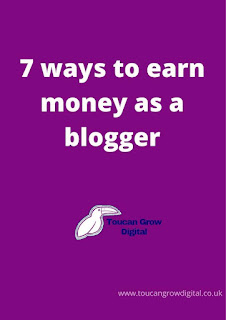When I tell people "I'm a blogger" the most common question I am asked is “how do you make money through by blogging?”. The answer tends to be a little longer than most people are interested in, other than those interested in having a blog themselves, but fortunately for those wanting to earn through their blog there are lots of ways you can make money. While there is nothing wrong with having a “hobby blog” (a non-monetised blog you do just for enjoyment), most people will want to at a minimum cover their costs and many bloggers earn a good regular income. So how can you make money with a blog?
 |
| There are lots of ways you can earn money through your blog |
Ways To Make Money Through Blogging
AD Networks
Having ADs on your website is a great way to make money if you have a good number of visitors to your website. You can sign up to various networks who automatically place adverts on your site so it is minimal effort. These ADs are images or videos that promote a company and while you can normally choose where ADs are placed and exclude certain categories you don’t have any say over which ADs are shown or who sees what. You get paid depending on how many people see the advert and how many people click on the AD to the linked websites.
Some AD Networks have minimum traffic requirements before you can join which allows them to deliver better quality adverts and give higher payouts, Mediavine for instance ask for a minimum of 50k sessions a month where as Googles ADs has no minimum.
You can also sell advertising space directly to companies for instance in your side bar, this is harder work to arrange, but can be more rewarding if your page views aren't huge.
If you are happy to have ADs on your site and have a good number of views ADs are a great passive way to earn money allowing you to make money without any specific effort.
Affiliate Income
Most companies which sell products or services online have affiliate schemes you can sign up to. With affiliate marketing you can get paid by companies if you send customers their way. Most affiliate schemes work with a personalised link you place on your website which uses cookies to track when people click through to their website and make a purchase. Some schemes require the customer to put a code in at checkout, which give the customer a discount and allow the seller to track the purchase to you.
The commission you earn varies between companies ranging from 1% for some categories on Amazon Affiliates to 50% on some software referrals. Making purchases through an affiliate link doesn’t cost the customer anything extra, your commission comes from the seller.
Affiliate links in popular blog posts can be a great way to get passive income if you are persuasive enough to encourage people to click through and make a purchase.
Brand Work
While a lot of brands are very keen to work with influencers with strong social media accounts, many still see the value in working with blogs too. Different brands will have different requirements but they are generally looking for a large audience base or engaged readers in a specific niche, well written posts and good quality images. Brand work can be very well paid and rewarding.
Paid Links
While it’s a whole other blog posts worth of discussion about whether you should accept paid links on your site, the fact remains many bloggers do and receive a steady income from it. Over time blogs (and websites) develop authority, for instance Google will recognise it as a good site to show in search results. Search engines use very complicated algorithms to decide how useful the sites are but one of the measures is believed to be how often they are linked to from other websites. Different types of links have varying value but in short brands (and SEO’s on behalf of brands) are prepared to pay for links.
Google doesn’t like this because it’s not organic and it could mean unhelpful results are shown to people using the search engine. If people want to make their website more visible on Google they would prefer them to pay them via Google ADs. There is a risk you can be penalised by Google so you wont get shown in search results, but it's not illegal to do.
For bloggers that have a useful area of expertise there are some additional ways that they can use their blogs to generate income.
Selling Products
Bloggers can sell products on their blog which might be physical products (eg mugs or planners) or some form of download. If you either have a have a really engaged audience or a strong authority on a particular topic then this is a great way to build on it. Digital downloads can be fictional ebooks, guides on how to do something, recipe books, colouring sheets or even Lightroom presets.
Courses
If you have enough knowledge on a particular area you can sell this information via courses. These might be a series of live sessions, pre recorded videos, written content or a combination of these. A particular selling point is people being able to ask you questions directly and get your advise.
Memberships
One step beyond a course or products is to offer memberships. To be successful you need to be able to offer value to your audience on an ongoing basis. A membership might include regular exclusive content, coaching, opportunities etc.
If you are just starting your blog and need to bring in extra income there are other ways you can earn money flexibly at home while building your blog up. Realistically you are unlikely to make any significant income in your first year blogging unless you are bring your audience with you eg you already have a large social media following.
There are also countless other opportunities which blogging may open the doors to including: copywriting, newspaper/ magazine columns, talking at conferences, book deals and blogger outreach, but these are essentially using your blog as a platform to do something else rather than making money through your blog.
The Importance of Disclosure
There are lots of rules about disclosing paid work which basically boil down to: you mustn’t mislead your audience. If you have received payment for something or will receive payment then you need to let readers know and they need to know in advance. That means disclosing at the beginning of posts and before links. In the UK the ASA and CAP provide detailed guidance and essentially say you should mark everything as an AD (or #AD). Having spoken to many non-bloggers I don’t think that actually makes it very clear at all so to cover both bases I would suggest stating “AD” and then clarifying what you mean eg “I received this product for free and was paid to write about it”.
When To Register As Self Employed
As an aside, in the UK you should register as self employed when you start earning money through blogging. This applies whether you receive vouchers or monetary payment. Currently you are allowed to make £1000 in a financial year without registering as self employed. When you are registered as self employed you will need to submit a tax return each year, but that isn’t as scary as it sounds and you can get help from an accountant if you need to.
How Much Can A Blogger Earn?
An established blogger working full time can easily earn over £1000 a month with no upper limit on earnings. BUT it takes a lot of work to become established and for some bloggers it can take years before they start to earn anything.
I have earned £500 for a single blog post before, but receive regular emails offering work for $10 (which I don’t accept). I find brand work is inconsistent, but AD and affiliate income steadily increases overtime.
It’s important to recognise the value that you offer as a blogger, especially if you have a large audience. You aren’t just being paid for that piece of work but for access to your audience and the time you have spent building up your blog.
 |
| Why not save on Pinterest for later? |
